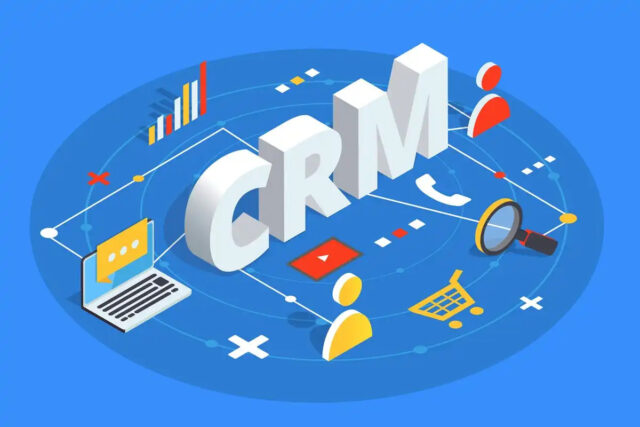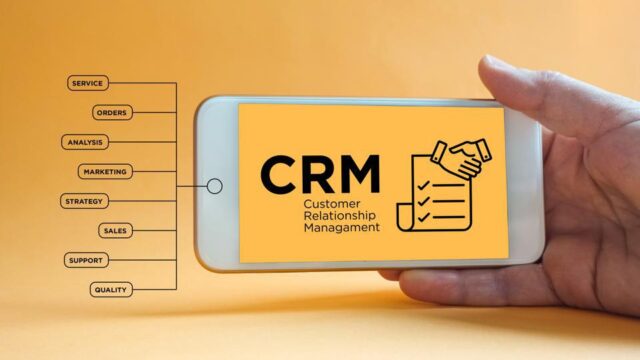
In the contemporary, fiercely competitive business landscape, the implementation of a Customer Relationship Management (CRM) system has emerged as an imperative strategy for managing and nurturing customer relationships. Nevertheless, the strategic decision confronting businesses often revolves around a pivotal choice: whether to embark on a journey of custom.
CRM development or to embrace the convenience of an off-the-shelf CRM software package. Each avenue presents a distinct array of advantages and limitations, with the choice ultimately hinging on the specific needs, objectives, and resources of the enterprise.
Custom Customer Relationship Management (CRM) Development
Instead of using off-the-shelf CRM software, custom CRM development builds a CRM solution from scratch or extensively customizes an existing platform to suit the organization’s distinct requirements. Custom CRM development services involve creating a personalized Customer Relationship Management (CRM) system tailored to a specific business’s unique needs.
Advantages

- Bespoke Alignment: Custom CRM development offers the singular advantage of crafting a solution that impeccably aligns with the intricacies of a business’s unique processes. It empowers the integration of features and functionalities that are tailored precisely to the peculiarities of a particular industry or customer base.
- Scalability: As the enterprise experiences organic growth, the custom CRM system scales seamlessly in tandem, adapting and expanding to accommodate evolving operational requirements.
- Data Security: Custom CRMs extend an unparalleled degree of control over data security and regulatory compliance, a paramount consideration in sectors subject to stringent data protection regulations.
- Competitive Distinction: The bespoke nature of custom CRMs enables businesses to gain a competitive edge by offering distinctive features and capabilities that set them apart from industry peers.
Drawbacks
- Initial Capital Outlay: The development of a custom CRM system typically demands a higher upfront financial investment compared to readily available off-the-shelf solutions.
- Time to Market: Building a custom CRM entails a meticulous development process, potentially resulting in a delayed realization of operational benefits.
- Sustained Maintenance: Ongoing resource allocation is imperative for maintaining, updating, and addressing any potential software glitches within the custom CRM.
Off-the-Shelf Customer Relationship Management (CRM)
Off-the-shelf CRM development involves selecting and configuring a pre-built Customer Relationship Management (CRM) software solution to meet specific organizational needs. A custom CRM development, which creates a CRM system from scratch, this approach relies on existing software products that also use the full stack development services
Advantages

- Cost-Efficiency: Off-the-shelf CRM software solutions emerge as a cost-effective alternative, devoid of the substantial capital expenditure associated with custom development.
- Rapid Deployment: A key advantage lies in the expeditious deployment of off-the-shelf solutions, a critical factor when time is of the essence.
- Community Backing: These pre-packaged solutions often boast thriving user communities, facilitating access to an abundance of user-generated resources and support.
- Routine Enhancements: Vendors consistently augment and refine their CRM software packages, ensuring that businesses enjoy access to the latest features and functionalities.
Drawbacks
- Limited Customization: While many off-the-shelf CRM systems permit a degree of customization, the extent to which one can tailor the software to exact specifications remains restricted.
- Scaling Challenges: As the enterprise expands its footprint, limitations may surface when endeavoring to scale an off-the-shelf CRM to suit evolving operational requisites.
- Data Custodianship: Businesses relinquish a degree of control over data ownership and storage with off-the-shelf solutions, potentially exposing them to security and compliance risks.
How to Make the Appropriate Customer Relationship Management (CRM) Choice for the Business?

The right CRM choice to make for a business can be made by:
- Holistic Needs Assessment: Enterprises must embark on a comprehensive examination of their operational processes, strategic objectives, and CRM requirements as a foundational step.
- Budgetary Deliberations: A meticulous evaluation of budget constraints is necessary, with the assessment extending to the comparison of the upfront investment against long-term returns.
- Timeframe Consideration: The timeline for CRM implementation should factor prominently into the decision-making process. Depending on urgency, a choice must be made between immediate deployment and investing the time requisite for custom development.
- Security and Compliance Emphasis: For industries under the regulatory microscope, where data security and compliance are paramount, that often represents the more secure choice.
- Scalability: Growth projections must be scrutinized. If scalability stands as a paramount concern, the custom solution may align more cohesively with the enterprise’s aspirations.
The Crucial Aspects of Choosing the Right CRM System
Navigating the complexities of selecting the perfect Customer Relationship Management (CRM) system can be daunting. Whether custom or off-the-shelf, it’s essential to look beyond surface-level features. Here are some pivotal aspects to consider:
1. User Experience and Training
Differences between custom and off-the-shelf CRM systems can be stark, particularly in terms of user experience. Custom solutions boast the advantage of being tailored to meet the exact needs of an organization. This means they can be molded for a more intuitive interface that aligns seamlessly with unique business processes. However, such customization might come with a catch: the need for specialized training. For employees unfamiliar with bespoke interfaces, learning the ropes can take time. On the other hand, off-the-shelf solutions usually feature standardized interfaces that many users might have encountered in previous roles, potentially shortening the learning curve.
Example: A company previously using generic CRM solutions might find that employees adapt quicker to another off-the-shelf product, while a startup might prefer to design a CRM that fits their innovative workflow, even if it requires more intensive training sessions.
2. Integration with Existing Systems

When thinking of CRM, consider how it fits into the broader tech ecosystem of your organization. Will it gel seamlessly with your ERP systems, marketing automation software, or analytics platforms? An ill-fitting integration can result in reduced efficiency, data silos, and increased operational costs.
Practical Tip: Before settling on a CRM, list down all existing tools and software. Then, investigate the CRM’s integration capabilities either through vendor documentation or direct consultations.
3. Total Cost of Ownership (TCO)
It’s not just about the sticker price. Beyond the initial investment, the long-term expenses associated with licensing, maintenance, and support for off-the-shelf solutions can add up. Custom solutions might require a heftier initial outlay, but could prove cost-effective in the long run, especially if they reduce the need for frequent upgrades or external support.
4. Vendor Reputation
For off-the-shelf CRM solutions, the credibility of the software vendor cannot be overlooked. A reputable vendor typically ensures reliable support, timely updates, and a robust product.
Research Tip: Dive into reviews, case studies, and customer testimonials. Websites like G2 Crowd or Capterra can provide insights into real user experiences.
Conclusion
The choice between custom CRM development and off-the-shelf CRM solutions is a multifaceted decision that hinges upon the distinctive needs, budgetary considerations, and expansion plans of each enterprise. Prudent consideration, supplemented by consultation with CRM experts, is fundamental in guiding an enterprise toward the optimal CRM solution that harmonizes seamlessly with its strategic objectives.












